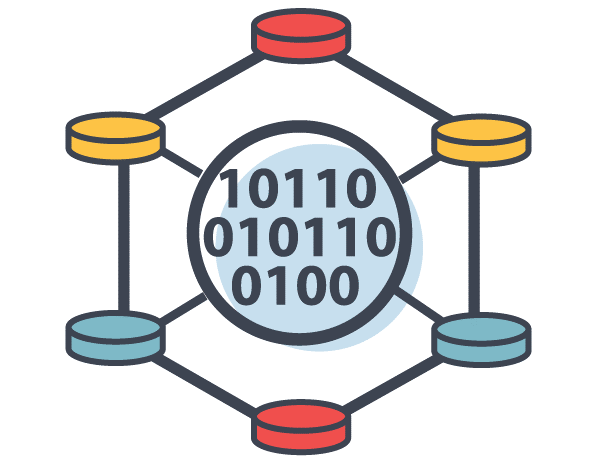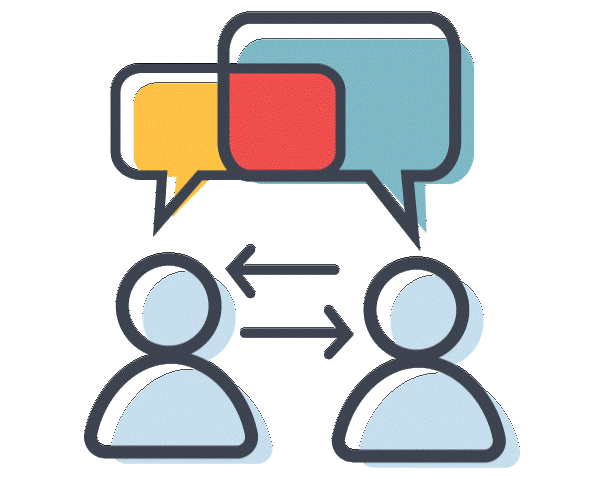TOWARDS INCLUSIVE, WHOLE-OF-SOCIETY DIGITAL TRANSFORMATION
DIGITAL, THE NEW NORMAL
Digital technology is increasingly altering how society functions, especially how people access public services, make decisions, and interact with each other. It is a force that can be utilized to drive inclusive, positive change in society.
Ultimately, digital presents a mindset that translates to a new way of working - enabling people and institutions to innovate with technology.
has identified digitalization as one of the three key enablers to scale-up development impact.

An inclusive digital transformation journey is one founded on a whole-of-society approach that leaves no one behind.
Building a holistic, cross-sectoral digital vision that includes public and private institutions, businesses, and people is crucial for accelerating an inclusive digital transformation process in Kosovo.
EXPLORING KOSOVO’S DIGITAL STATUS & POTENTIALS
UNDP Kosovo is committed to supporting a successful digital transformation that is inclusive and empowers Kosovo to achieve the Sustainable Development Goals (SDGs).
This journey is guided by our Digital Transformation Portfolio process which aims to understand the local digital landscape and support connected initiatives that learn from each other.
The Portfolio applies learning, sensemaking, and problem-solving to accelerate the following system-wide effects:
|
1) Enable affordable, accessible, and reliable digital access and use for all 2) Support intelligent and green economy 3) Improve people’s digital experiences and empower communities |
UNDP Kosovo utilizes scientific tools and methods to uncover insights and formulate recommendations that support the exploration of Kosovo’s digital strengths, challenges, and opportunities.
The Digital Readiness Assessment was launched in 2021, complemented by the Digital Household Survey.

Digital Readiness Assessment (DRA)
The DRA is a survey-based tool designed to provide high-level insights and assessments on the readiness and other aspects of digital transformation, with a focus on central institutions, people, businesses, infrastructure, and regulation.
DRA findings suggest that Kosovo is systematically advancing in key areas of digital transformation based on identified priority areas.

Digital Household Survey (DHS)
A Kosovo-wide survey that captured experiences and perceptions of 2,400 households on the accessibility, usage, and affordability of digital tools, services as they pertain to behavior change, obtaining of public services, etc.
FOCUS AREAS AND OUTCOMES

Digital Enabler lays the ground for building a digital space that is accessible, equitable, and reliable. It encompasses aspects pertaining to hardware & software, connectivity, regulations, and digital skills to enable the use of digital goods and services by all.
|
UNDP Kosovo strategic positions: 1. Expanding knowledge, such as digital skills and literacy, is vital for accelerating an inclusive digital transformation. 2. Opportunities to diminish uneven access to digital technologies in the society and facilitating digital inclusion that enables access for all. |
Analysis:
- Kosovo has wide internet access and ownership of IT devices among the population, with over 99.7% of households reporting to have internet access. The access is evenly distributed across Kosovo, with the internet penetration rate considered the highest in the Western Balkans.
- There are no significant digital divides along gender and ethnic lines with regard to accessibility, however, divides exist along age lines. People aged 75 and over have lower internet access rate compared to the average.
- In almost 90% of the cases, smartphones are considered either entirely affordable or affordable to some extent, with a very slight gender divide (7% less true for women, 1.5% less true for low-income households).
- The productive use of the internet remains challenging dependent on income level and educational attainment. Higher-income households and more educated respondents conduct a wider range of activities, while lower-income households and less educated respondents use the internet mainly for social networking.
- The findings suggest that a large proportion are digitally illiterate or inefficient in various digital skills that go beyond social communication and internet surfing. It is recommended that concrete steps should be taken in offering integrated ICT education programs into earlier stages of education.
KOSOVO DIGITAL AGENDA 2030
✓ SO3: Digitalization of government
✓ SO4: Adapt education to the digital age

Digital Economy encompasses all aspects of the economy that use and benefit from digital technology in transforming markets, products, business models and operations. It relies on technology to foster innovation, create new opportunities for businesses and jobs, increase productivity and flexibility thus contributing to economic growth and improving livelihoods.
|
UNDP Kosovo strategic positions: 1. Opportunities around investment in different business models and learning about diversity of profit-making activities. 2. The intersection between finance, public and private sector to identify opportunities to increase access to financing contingencies for the private sector, driving the digital economy. 3. Understanding the key needs in supporting end-to-end digital business development. |
Analysis:
- A digital payments ecosystem is crucial in enabling the benefits of e-commerce. However, we see that only about half of the population, with a clear majority being men, have a bank account. Data indicates that a considerate percentage of these account owners do shop online. Ultimately, a key precursor to increasing online shopping is account ownership.
- Indications in the data for Kosovo show that women are disadvantaged in entering and excelling in the formal and informal parts of the digital economy (access to finance, flexible and family-friendly work arrangements, STEM background, etc.).
- Promising innovators in Kosovo are being slowed down by a lack of access to financing opportunities from the public and private sectors, which is limiting digital transformation.
- Private sector modernization needs support through financing and public sector innovation opportunities. The studies point to a need to develop incentive schemes for businesses that ultimately lead to better products and services that improve livelihoods.
- Given the considerable levels of unemployment among women and first-time jobseekers, an inclusive focus on upskilling these specific groups may be beneficial, especially via creative and targeted outreach techniques that stimulate interest.
KOSOVO DIGITAL AGENDA 2030
✓ SO2: Digital transformation of businesses
✓ SO4: Adapt education to the digital age
✓ SO5: Remote innovative and intelligent R&D system

Digital Trust considers accountability, transparency, integrity and security of both digital and physical space that utilizes digital technology. It assesses and sets guiding aspects such as regulation, institutional trust, and increasing skills in public institutions. etc.
|
UNDP Kosovo strategic positions: 1. Secure, reliable, user-friendly, accountable, and transparent government service. 2. Explore variables around leveraging data, while protecting privacy. |
Analysis:
- Most members of the society seem very willing to embrace new technologies, viewing them as main drivers for behavior change, especially in the social, cultural, and work domains.
- The public is keen to use digital tools to interact with institutions. About 91% of the e-Kosova platform users report to be satisfied with the services it provides.
- DRA suggests that there are currently few digital public services and people have limited access to open public data.
- An Open Data portal exists, managed by Agency of Information Society (AIS), but there appears to be little knowledge around it, or how to leverage it for business and government opportunities.
- Users demand an increase in the number and types of digitized public services. They suggest digitized school enrollment, court services, signatures, grants access, service registrations of various kinds, customs clearance, more user friendly procurement (facilitation of rather than review), and essential services.
- While cybersecurity is not seen as a major concern, many people lack knowledge about how their personal data is being collected, used, and shared on the internet, indicating the need for cybersecurity awareness as a priority.
- A streamlined, transparent e-procurement would increase trust in institutions.
KOSOVO DIGITAL AGENDA 2030
✓ SO3: Digitalization of government
✓ SO6: Strengthen all - present cybersecurity

Digital Society is about interaction between people, and private and public institutions. It is about communicating, engaging and taking action as a result of adaptation and integration of digital technologies into the society. Engagement in socio-economic, governance, political, and cultural activities is done by constantly creating and sharing information, products, and services via technology.
|
UNDP Kosovo strategic positions: 1. Enable a data-driven society, empowered to make intelligent, adaptive and data-based decisions. 2. Understand how our behaviors are influenced and changed as a result of digital communication. |
To enable a developed society to exist, the public must be able to make data-informed decisions. They must be aware of the data resources available and the right to access them. The public should also be educated on the potential of data in informing important decisions such as business decisions, education opportunities, and academic achievements.
For such resources to be available in the first place, the public must be able to rely on institutions to employ functional data collection, dissemination, publication, and promotion.
- Digital Literacy for data-driven society. The public can only make data-driven decisions if the majority adopts a mentality that recognizes the relevance of data and is educated on how to make use of data in making data-driven decisions that affect their personal and public lives. Currently, this marks a domain that calls for intervention opportunities, especially in raising awareness and shaping such a mentality.
- Data-driven decision-making. There is little public information that discusses or propagates the importance of data-driven decision-making for a developed and inclusive society. The main dialogue surrounding this topic sits within the academia, particularly in the domain of the researchers and academic personnel.
- Positive behavior changes thanks to technology. Existing data shows that the public trusts that technology is an efficient tool in promoting positive behavior change. Around two-thirds of the subjects have expressed that they feel that technology has a positive impact in their lives, citing multiple life domains, showing confidence in technology as a driver for positive change.
- Acquiring Data. A structured data collection and data dissemination framework, continues to constitute one of the main challenges in building a data-driven society. There are significant gains for Kosovo if processes such as acquiring data and data sharing are strengthened, but that requires policy, capacity, systems links, as well as legislative actions.
- Open Data. Open Data sits at the crux of institutional transparency. The public can exercise their right in obtaining data that is machine readable from a designated Open Data Portal. However, institutions face challenges in updating and opening certain types of data sets, impacting this way the consistency, usability, and reliability of open data.
KOSOVO DIGITAL AGENDA 2030
✓ SO4: Adapt education to the digital age

 Locations
Locations